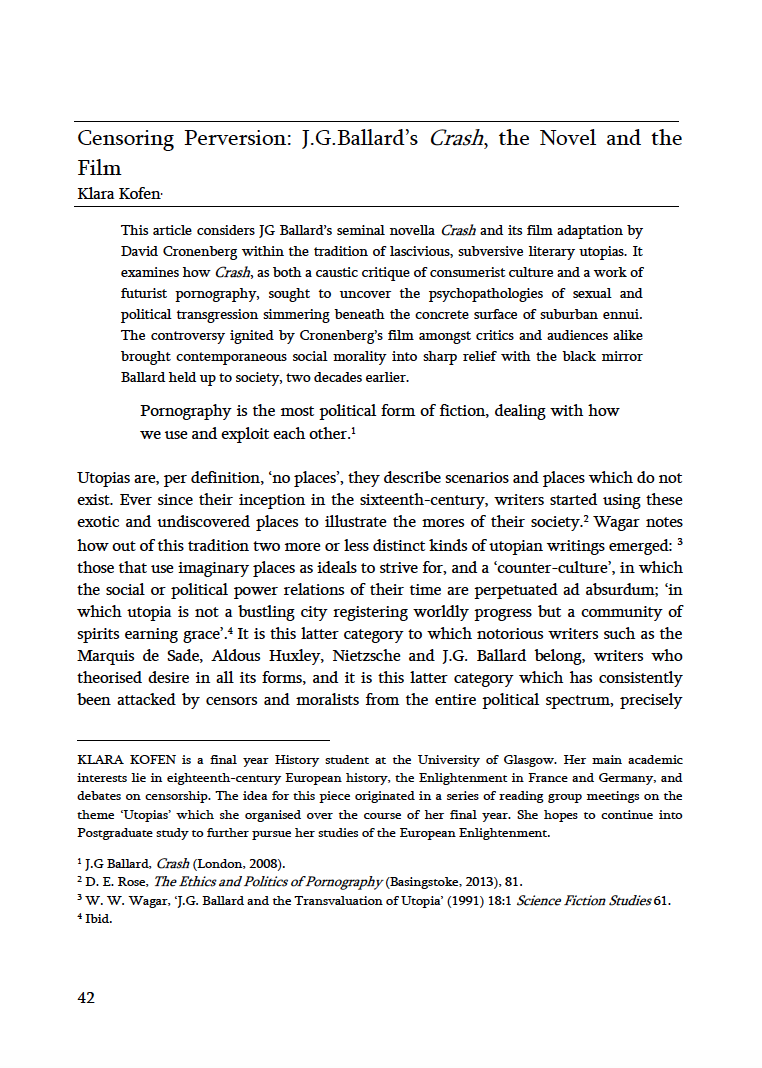Censoring Perversion
J.G.Ballard’s Crash, the Novel and the Film
DOI:
https://doi.org/10.36399/GroundingsUG.8.207Keywords:
JG Ballard, Crash, Cronenberg, Utopia, Consumerism, Futurism, Pornography, Ennui, Morality, CensorshipAbstract
This article considers JG Ballard’s seminal novella Crash and its film adaptation by David Cronenberg within the tradition of lascivious, subversive literary utopias. It examines how Crash, as both a caustic critique of consumerist culture and a work of futurist pornography, sought to uncover the psychopathologies of sexual and political transgression simmering beneath the concrete surface of suburban ennui. The controversy ignited by Cronenberg’s film amongst critics and audiences alike brought contemporaneous social morality into sharp relief with the black mirror Ballard held up to society, two decades earlier.
References
J. G. Ballard, Crash (London, 2008).
J.G. Ballard, A Users Guide to the Millenium (London, 1996).
G. Bataille, Eroticism translated by M. Dalwood (London, 1987).
G. Bataille, The Accursed Share translated by R. Hurley (Brooklyn, 2013).
Cronenberg dir., Crash, UCA, (2007) Film.
D. A. F. De Sade, Philosophy in the Bedroom translated by R.Seaver & A. Wainhouse (2002), digitised by Supervert 32C Inc. Available: <https://itp.nyu.edu/classes/germline-spring2013/files/2013/01/philosophy_in_the_bedroom.pdf> [Accessed 15.07.14].
F. T. Marinetti, ‘Futurist Manifesto’ in U. Apollonio (ed.), Documents of 20th Century Art: Futurist Manifestos (New York, 1973).
Z. Smith, ‘Sex and Wheels: Zadie Smith on JG Ballard’s Crash’ in The Guardian, (04.07.2014).
M. Barker, J. Arthurs & R. Harindranath, The Crash Controversy –Censoring Campaigns and Film Reception (London, 2001).
J. Baudrillard, ‘Ballard’s Crash’ translated by A. B. Evan (1991) 18:3 Science Fiction Studies 313-320.
J. Baudrillard, Simulacra and Simulations -XIII. Simulacra and Science Fiction translated by S. F. Glaser. Available <http://www.egs.edu/faculty/jean-baudrillard/articles/simulacra-and-simulations-xiii-simulacra-and-science-fiction/> [Accessed 16.07.14].
D. Bordwell & K. Thompson, Film Art: An Introduction, 3rd Edition (New York, 1990).
M. Delville, J.G. Ballard (Plymouth, 1998).
D. Evans, An Introductory Dictionary of Lacanian Psychoanalysis (London, 2002).
D. A. Foster, ‘J. G. Ballard's Empire of the Senses: Perversion and the Failure of Authority’ (1993) 108:3 PMLA519-532.
T. Goldstein, ‘J. G. Ballard: Visionary of the Apocalypse’ (1982) April Heavy Metal 38-40. Available <http://jgballard.ca/media/1982_april_heavy_metal_magazine.html> [Accessed 15.07.14].
C. Greenland, The Entropy Exhibition: Michael Moorcock and the British ‘New Wave’ in Science Fiction (London, 1983).
C. A. MacKinnon, ‘Francis Biddle's sister: pornography, civil rights, and speech’ in Feminism Unmodified: Discourses on Life and Law (Harvard, 1987).
F. E Manuel & F. P. Manuel, Utopian Thought in the Western World (Massachusetts, 1979).
R. Porton, ‘The Film Director as Philosopher: An Interview with David Cronenberg’ (1999) 24:4 Cinéaste 4.
D. E. Rose, The Ethics and Politics of Pornography (Basingstoke, 2013).
W. W. Wagar, ‘J.G. Ballard and the Transvaluation of Utopia’ (1991) 18:1 Science Fiction Studies 53-70.

Downloads
Published
Issue
Section
License
Copyright (c) 2015 Klara Kofen

This work is licensed under a Creative Commons Attribution 4.0 International License.
The CC BY 4.0 license is a Creative Commons license. This is a non-copyleft free license that is good for art and entertainment works, and educational works. It is compatible with all versions of the GNU GPL; however, like all CC licenses, it should not be used on software. People are free to: Share — copy and redistribute the material in any medium or format; Adapt — remix, transform, and build upon the material for any purpose, even commercially. The licensor cannot revoke these freedoms as long as you follow the license terms. But they must conform to the following terms: Attribution — You must give appropriate credit, provide a link to the license, and indicate if changes were made. You may do so in any reasonable manner, but not in any way that suggests the licensor endorses you or your use. No additional restrictions — You may not apply legal terms or technological measures that legally restrict others from doing anything the license permits.
Please check individual article PDF copies to see if any additional restrictions apply.







